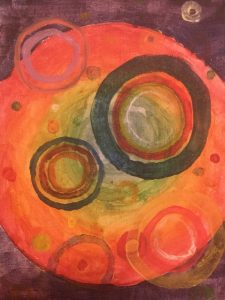Did you know that 30 June is International Asteroid Day? I didn’t until recently, but when I found out, it prompted me to take a closer look at what asteroids are, and why they’re important, and what I found out was fascinating, but also a bit scary.
Asteroids are essentially lumps of rock that orbit the sun but are too small to be considered planets, or even dwarf planets. They usually have roughly circular orbits and are mostly found in a dense belt between the orbits of Mars and Jupiter. Occasionally however, gravitational forces kick asteroids out of their usual positions and send them hurtling towards the inner solar system.
Sometimes, these asteroids even collide with our own planet, and when they do, the consequences can be catastrophic. Evidence suggests that about 65 million years ago, an asteroid that would have been between 5 and 10 km across hit the Earth in what is now Mexico, causing an explosion so enormous that its effects caused the extinction of more than three-quarters of all the plant and animal species alive at the time, including all of the dinosaurs (although not the birds, which had evolved from them and are therefore part of the dinosaurs’ evolutionary lineage).
On the morning of 30 June 1908, a much smaller asteroid (perhaps around 100 metres across) exploded in the Earth’s atmosphere above a thankfully sparsely populated area of eastern Russia called Tunguska, which is why International Asteroid Day takes place on that day. Despite the fact that there was no actual impact, it completely flattened a 2,000 square kilometre area of forest. Understandably, there is now a global effort to track near-Earth asteroids that are a potential threat to our survival, and International Asteroid Day aims to raise awareness of the need to protect Earth from asteroid impacts.
Thankfully though, it’s not all bad news. Although we tend to think of asteroids as a threat, they also represent a huge opportunity as they are often rich in valuable mineral resources that are rare here on Earth. Asteroid mining is a staple of golden-age hard science-fiction, as well as a priority for current spacefaring nations and private companies. The European Space Agency’s recent Rosetta mission showed that it is technically possible to travel to, and land probes on, such objects, although after close fly-bys of two asteroids, it actually landed on an icy comet rather than a rocky asteroid. Excitingly, the Japanese spacecraft Hyabusa2 is currently on its final approach to the asteroid Ryugu, and with other similar expeditions planned, like NASA’s Asteroid Redirect Mission, exploitation of asteroids looks set to be an increasingly important feature of space exploration in the near future. Once perceived only as a threat to humanity, asteroids may eventually become a source of materials that could help us explore the furthest reaches of our solar system, and beyond.
Since the discovery of the first asteroid in 1801, these lumps of rock have captured our imaginations. The dual nature of asteroids as both friends and foe has given rise to a rich literature of both fiction and non-fiction. This International Asteroid Day, why not check out some of the books about asteroids that we have here at Christchurch City Libraries? To help you, I have a compiled a short list of places you might want to start...
Books about humanity's long-standing relationship with asteroids, what they are, why they're important, including both fiction and non-fiction




Add a comment to: Asteroids – friends or foe?